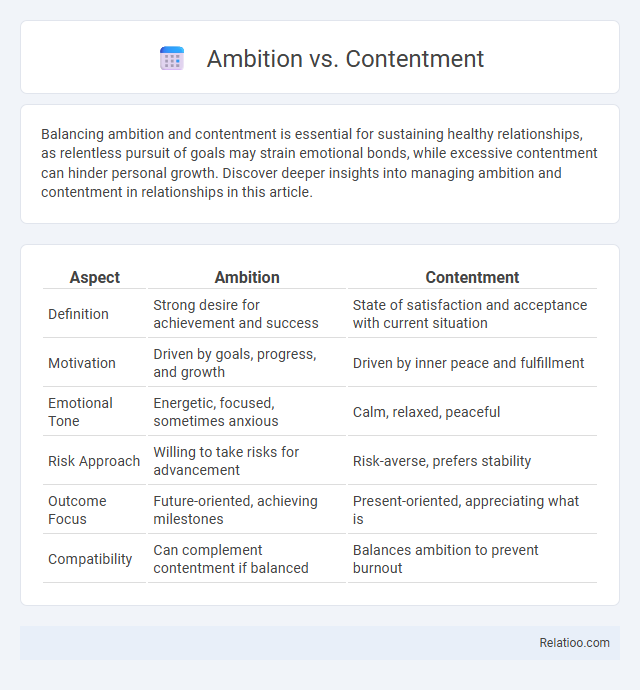Balancing ambition and contentment is essential for sustaining healthy relationships, as relentless pursuit of goals may strain emotional bonds, while excessive contentment can hinder personal growth. Discover deeper insights into managing ambition and contentment in relationships in this article.
Table of Comparison
| Aspect | Ambition | Contentment |
|---|---|---|
| Definition | Strong desire for achievement and success | State of satisfaction and acceptance with current situation |
| Motivation | Driven by goals, progress, and growth | Driven by inner peace and fulfillment |
| Emotional Tone | Energetic, focused, sometimes anxious | Calm, relaxed, peaceful |
| Risk Approach | Willing to take risks for advancement | Risk-averse, prefers stability |
| Outcome Focus | Future-oriented, achieving milestones | Present-oriented, appreciating what is |
| Compatibility | Can complement contentment if balanced | Balances ambition to prevent burnout |
Defining Ambition and Contentment
Ambition is the driving force behind setting and pursuing goals, characterized by a strong desire for achievement, success, and personal growth. Contentment refers to a state of satisfaction and acceptance of one's current circumstances, emphasizing peace and fulfillment without the constant urge for more. Balancing ambition and contentment requires understanding the distinction between striving for improvement and appreciating present achievements.
The Psychology Behind Ambition
The psychology behind ambition reveals a complex interplay between intrinsic motivation, goal-setting, and self-identity, driving individuals to pursue growth and achievement. Ambition often stems from a desire for mastery and recognition, influencing decision-making and emotional well-being, while contentment emphasizes acceptance and satisfaction with current circumstances. Understanding this balance can help you align aspirations with personal happiness, optimizing both productivity and mental health.
The Power of Contentment in Daily Life
Contentment anchors your daily life by fostering gratitude and reducing stress, creating a mental state that supports emotional resilience and well-being. While ambition drives progress and goal achievement, the power of contentment ensures satisfaction with the present moment, preventing burnout and anxiety. Balancing ambition with contentment enables sustainable success and a fulfilling lifestyle.
Ambition: Pros and Cons
Ambition drives individuals to set and achieve challenging goals, fostering personal growth, innovation, and career advancement. However, excessive ambition can lead to stress, burnout, and strained relationships due to relentless pursuit of success. Balancing ambition with contentment is essential for sustained well-being and long-term fulfillment.
Contentment: Strengths and Weaknesses
Contentment fosters mental well-being by promoting gratitude, reducing stress, and encouraging satisfaction with current achievements, which enhances emotional stability and long-term happiness. Its weaknesses include the risk of complacency and reduced motivation, potentially limiting personal growth and the pursuit of new opportunities. Understanding when to balance contentment with ambition helps you maintain fulfillment while striving for meaningful progress.
Finding the Balance Between Ambition and Contentment
Balancing ambition and contentment requires recognizing your goals without sacrificing inner peace. Ambition drives progress and achievement, while contentment fosters gratitude and well-being. You can cultivate success by setting realistic goals that inspire growth while appreciating your current accomplishments.
Societal Perspectives on Success and Satisfaction
Societal perspectives on success often valorize ambition, framing relentless goal pursuit as the pathway to achievement and social recognition, while contentment is frequently perceived as complacency or lack of drive. Cultures that emphasize high ambition may equate success with material wealth, status, and continuous improvement, whereas societies valuing contentment prioritize well-being, balance, and inner satisfaction over external accomplishments. This dichotomy influences individual life choices, shaping how people define fulfillment and measure their social worth in the context of community expectations and cultural norms.
How Ambition Drives Personal Growth
Ambition fuels personal growth by pushing individuals to set challenging goals and strive for continuous improvement, fostering resilience and skill development. It encourages a proactive mindset, leading to increased motivation, innovation, and the pursuit of opportunities beyond comfort zones. While contentment offers stability, ambition catalyzes transformation by driving individuals to unlock their full potential and realize achievements that contribute to long-term success.
Cultivating Contentment Without Settling
Cultivating contentment without settling requires balancing ambition with realistic self-awareness and gratitude for present achievements. Embracing contentment means appreciating progress and small victories while maintaining clear goals and a drive for meaningful growth. This harmony fosters sustained motivation and mental well-being by preventing burnout and dissatisfaction often caused by relentless ambition.
Practical Tips for Harmonizing Ambition and Contentment
Balancing ambition and contentment requires setting clear, achievable goals while appreciating your current progress, helping you maintain motivation without burnout. Prioritize mindful reflection and gratitude practices to enhance your sense of contentment, even as you strive for future success. Regularly reassess your priorities to ensure your ambitions align with your values, fostering sustainable growth and personal fulfillment.

Infographic: Ambition vs Contentment
 relatioo.com
relatioo.com